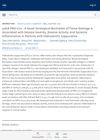 489 citations,
November 2021 in “Signal Transduction and Targeted Therapy”
489 citations,
November 2021 in “Signal Transduction and Targeted Therapy” The JAK/STAT pathway is important in cell processes and disease, and JAK inhibitors are promising for treating related conditions.
2 citations,
February 2023 in “Actas Dermo-Sifiliográficas” Baricitinib effectively improved both atopic dermatitis and alopecia areata symptoms in a patient.
December 2024 in “IntechOpen eBooks” Drug repurposing speeds up development, cuts costs, and uses known safe drugs, but faces challenges like regulations and patents.
 November 2023 in “Expert Opinion on Pharmacotherapy”
November 2023 in “Expert Opinion on Pharmacotherapy” Finasteride and dutasteride are effective in treating male hair loss but can cause sexual side effects and birth defects.
 September 2024 in “Journal of the American Academy of Dermatology”
September 2024 in “Journal of the American Academy of Dermatology” PRO-C22 can help diagnose and monitor the severity of hidradenitis suppurativa.
 2 citations,
September 2022 in “Cytotherapy”
2 citations,
September 2022 in “Cytotherapy” Fat-derived stem cells show promise for treating skin issues and improving wound healing, but more research is needed to confirm the best way to use them.
 1 citations,
July 2023 in “Journal of the American Academy of Dermatology”
1 citations,
July 2023 in “Journal of the American Academy of Dermatology” Pressure-induced hair loss is rare, often reversible, and early diagnosis is crucial to prevent complications.
 1 citations,
August 2023 in “JAMA Dermatology”
1 citations,
August 2023 in “JAMA Dermatology” Increasing the dose of baricitinib to 4 mg helps more patients with severe alopecia areata regrow hair.
 April 2024 in “Expert opinion on investigational drugs”
April 2024 in “Expert opinion on investigational drugs” JAK inhibitors are safe and effective for treating moderate-to-severe alopecia areata.
 20 citations,
December 2016 in “Neurodegenerative disease management”
20 citations,
December 2016 in “Neurodegenerative disease management” Teriflunomide effectively reduces relapses and disability in MS and has a manageable safety profile.
 16 citations,
April 2014 in “Expert Opinion on Pharmacotherapy”
16 citations,
April 2014 in “Expert Opinion on Pharmacotherapy” Teriflunomide is an effective and safe first-line oral treatment for relapsing multiple sclerosis.
 63 citations,
April 2018 in “Journal of the American Academy of Dermatology”
63 citations,
April 2018 in “Journal of the American Academy of Dermatology” Topical JAK inhibitors may help treat some skin conditions but need more research.

There are many treatments for common hair loss, but more trials are needed to decide which are best.
 213 citations,
June 2017 in “Rheumatology”
213 citations,
June 2017 in “Rheumatology” The guidelines suggest a detailed approach to diagnosing and treating lupus, with a focus on regular check-ups, personalized medicine, and a range of drug options for different cases.
 May 2024 in “Aktualʹnì problemi sučasnoï medicini: Vìsnik Ukraïnsʹkoï medičnoï stomatologìčnoï akademì”
May 2024 in “Aktualʹnì problemi sučasnoï medicini: Vìsnik Ukraïnsʹkoï medičnoï stomatologìčnoï akademì” Spironolactone and clascoterone are promising acne treatments with fewer side effects.
 February 2024 in “International Journal of Molecular Sciences”
February 2024 in “International Journal of Molecular Sciences” Hair loss in Androgenetic Alopecia is caused by genetics, aging, and lifestyle, leading to hair follicle shrinkage and related health risks.
355 citations,
January 2017 in “Journal of the American Academy of Dermatology” JAK inhibitors show promise for treating skin conditions like eczema, hair loss, and psoriasis.
January 2022 in “Springer eBooks”  5 citations,
May 2020 in “Clinical and Experimental Dermatology”
5 citations,
May 2020 in “Clinical and Experimental Dermatology” Clascoterone may be a promising treatment for hair loss.
 1 citations,
June 2021 in “Journal of dermatology and dermatitis”
1 citations,
June 2021 in “Journal of dermatology and dermatitis” Tyrosine kinase inhibitors show promise in treating some skin diseases but their definitive role in dermatology is still unclear.
 12 citations,
March 2016 in “Life Sciences”
12 citations,
March 2016 in “Life Sciences” The new chemotherapy combination of WP 631 and Epothilone B shows enhanced effectiveness against ovarian cancer but requires more research on its safety.
 March 2024 in “International journal of pharmaceutical sciences and drug research”
March 2024 in “International journal of pharmaceutical sciences and drug research” Androgenetic alopecia is influenced by various factors and can be treated with medications, procedures, and non-drug methods.
April 2020 in “The journal of investigative dermatology/Journal of investigative dermatology” Certain surgical methods are better than routine incision for hidradenitis suppurativa, topical clindamycin and acitretin are effective treatments, men with HS have a risk of skin cancer, HS patients are more likely to die from heart problems, and specific genetic markers are linked to treatment response.
July 2024 in “European Journal of Medicinal Chemistry” New small molecule drugs could help treat hair loss.
 4 citations,
February 2019 in “PubMed”
4 citations,
February 2019 in “PubMed” Clascoterone may be an effective topical treatment for hair loss.
 1 citations,
July 2023 in “International Journal of Molecular Sciences”
1 citations,
July 2023 in “International Journal of Molecular Sciences” Old psychiatric drugs are increasingly being used for new purposes, and technologies like SmartCube® help create new drugs.
 1 citations,
October 2022 in “Adolescent Health, Medicine and Therapeutics”
1 citations,
October 2022 in “Adolescent Health, Medicine and Therapeutics” Gender-affirming therapy can cause skin issues like acne and hair loss in transgender adolescents, and more research is needed on its dermatological effects.
 July 2023 in “JAAD International”
July 2023 in “JAAD International” Two drugs, finasteride and minoxidil, are approved for hair loss treatment, but new therapies are being developed.
 1 citations,
November 2018 in “Therapeutic Delivery”
1 citations,
November 2018 in “Therapeutic Delivery” New partnerships, clinical trials, and drug approvals marked progress in therapeutic delivery in July 2018.
 4 citations,
September 2022 in “Journal of The American Academy of Dermatology”
4 citations,
September 2022 in “Journal of The American Academy of Dermatology” Baricitinib was effective in regrowing hair in patients with different levels of alopecia areata severity.
























